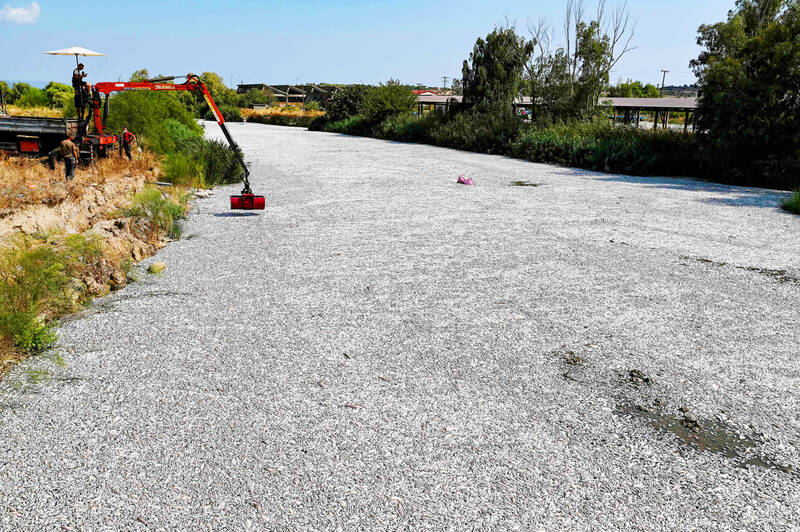Greek authorities have started collecting hundreds of thousands of dead fish that poured into a tourist port in the central city of Volos this week after the fish had been displaced from their usual freshwater habitats during flooding last year.
The floating carcasses created a silvery blanket across the port and a stench that alarmed residents and authorities who raced to scoop them up before the odor reached nearby restaurants and hotels.
“It spans kilometers,” Volos Councilor Stelios Limnios said.

Photo: AFP
“It’s not just along the coast, but also in the center of the Pagasetic Gulf,” he said, referring to the area offshore of Volos whose coast is lined with holiday homes.
On Wednesday, trawlers dragged nets to collect the fish that were then dumped in the back of trucks.
More than 40 tonnes had been collected in the past 24 hours, authorities said.
Volos Mayor Achilleas Beos said the smell was unbearable.
During a news conference on Wednesday, he blamed the Greek government for not dealing with the problem before it reached his city.
He said that rotting fish could create an environmental disaster for other species in the area.
Experts said the problem was caused by historic floods last year that inundated Thessaly plain further north, including rivers and lakes.
A net was not placed at the mouth of the river leading into Volos, they said.
When the fish met the sea, the saltwater likely killed them.
“They didn’t do the obvious, to put a protective net,” Beos said, referring to government services.
The Greek Ministry of Environment and Energy did not respond to a request for comment.
Local prosecutors have ordered an investigation.
The disaster is the latest impact of extreme weather in Greece that scientists link to climate change, including higher temperatures and erratic rainfall that cause wildfires and flooding.
Dimosthenis Bakoyiannis, 33, who owns a beach restaurant 10km from Volos, said his turnover dropped 80 percent this summer as fewer tourists wanted to visit after the flooding.
“Closing the barrier now doesn’t help,” he said. “Now it’s too late, the tourist season is over.”

The collapse of the Swiss Birch glacier serves as a chilling warning of the escalating dangers faced by communities worldwide living under the shadow of fragile ice, particularly in Asia, experts said. Footage of the collapse on Wednesday showed a huge cloud of ice and rubble hurtling down the mountainside into the hamlet of Blatten. Swiss Development Cooperation disaster risk reduction adviser Ali Neumann said that while the role of climate change in the case of Blatten “still needs to be investigated,” the wider impacts were clear on the cryosphere — the part of the world covered by frozen water. “Climate change and

Packed crowds in India celebrating their cricket team’s victory ended in a deadly stampede on Wednesday, with 11 mainly young fans crushed to death, the local state’s chief minister said. Joyous cricket fans had come out to celebrate and welcome home their heroes, Royal Challengers Bengaluru, after they beat Punjab Kings in a roller-coaster Indian Premier League (IPL) cricket final on Tuesday night. However, the euphoria of the vast crowds in the southern tech city of Bengaluru ended in disaster, with Indian Prime Minister Narendra calling it “absolutely heartrending.” Karnataka Chief Minister Siddaramaiah said most of the deceased are young, with 11 dead

Poland is set to hold a presidential runoff election today between two candidates offering starkly different visions for the country’s future. The winner would succeed Polish President Andrzej Duda, a conservative who is finishing his second and final term. The outcome would determine whether Poland embraces a nationalist populist trajectory or pivots more fully toward liberal, pro-European policies. An exit poll by Ipsos would be released when polls close today at 9pm local time, with a margin of error of plus or minus 2 percentage points. Final results are expected tomorrow. Whoever wins can be expected to either help or hinder the

DENIAL: Musk said that the ‘New York Times was lying their ass off,’ after it reported he used so much drugs that he developed bladder problems Elon Musk on Saturday denied a report that he used ketamine and other drugs extensively last year on the US presidential campaign trail. The New York Times on Friday reported that the billionaire adviser to US President Donald Trump used so much ketamine, a powerful anesthetic, that he developed bladder problems. The newspaper said the world’s richest person also took ecstasy and mushrooms, and traveled with a pill box last year, adding that it was not known whether Musk also took drugs while heading the so-called US Department of Government Efficiency (DOGE) after Trump took power in January. In a